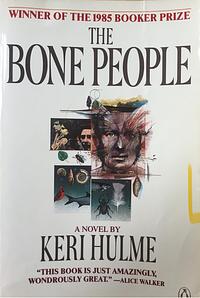You need to sign in or sign up before continuing.
Take a photo of a barcode or cover
I read this so many years ago that I can't remember it very fully. I need to go back and reread. Haunting, disturbing, beautiful...I remember these things.
wanted to like this book more than i do, really. i think the poetic Mish mash style of writing is playful and full of life, if a bit long winded sometimes. story is promising in this until we get to 2/3rd of the way through and the whole plot falls apart. i really wanted Joe to face consequences, i really wanted Simon to find his past & future HAPPILY, i really wanted Kerewin to, idk, get a bit of a reality check that she's not some iron skinned demi god capable of all. i don't regret reading this as it was a full 'experience' and definitely speaks to themes of family struggles and belonging, in this weird ethereal plane of te ao wairua me te ao kikokiko. however the story simply isn't strong enough to grant a reread.
Great for the first 300 pages, only finished the last 100 because I was On A Mission. Way too long.
Extraordinary; worth every rave review it received at the time, and a staggering contribution to literature. And deserving of every outcry of pain, at the same time.
I loved the language and the almost spiritual treatment of cadence and rhythm.
The subject matter is troubling, and the resolution is hard to swallow. I feel in some ways asked to take a journey that against all expectations succeeds in touching m the transcendent, and then.. I must now place a child in the bronze hands of moloch as tribute, an act of abasement to show I value the spiritual path above mundane concerns such as the lives of children. I do love you Kerewyn and the world you have pulled into being but I won’t do it.
I loved the language and the almost spiritual treatment of cadence and rhythm.
The subject matter is troubling, and the resolution is hard to swallow. I feel in some ways asked to take a journey that against all expectations succeeds in touching m the transcendent, and then.. I must now place a child in the bronze hands of moloch as tribute, an act of abasement to show I value the spiritual path above mundane concerns such as the lives of children. I do love you Kerewyn and the world you have pulled into being but I won’t do it.
Uma história de amor improvável, uma narrativa repleta de mitos, de lendas, de musicalidade, e de diálogos silenciosos. Absolutamente fascinante!!
#ReadWomenChallenge2019
#ReadWomenChallenge2019
This was one of the most challenging books I’ve ever read for a couple of reasons: 1) the formatting and 2) the sharp pivot between realism and mystical realism
The formatting:
Dialogue isn’t often attributed to a character. Perspective sometimes changes between paragraphs. Poetry is sprinkled into the text throughout the book. Famously, this book was never edited. What we read is the original manuscript from Hulme. Keep that in mind and be patient with your brain as you navigate the fluid “structure” of the book.
The pivot: While there was some mention of the other-worldly in Parts 1 and 2, Part 3 dives deep into Māori lore and mysticism. It was jarring when placed next two Parts 1 ans 2. But when you consider that the book is centered around three characters with different relationships to Māori culture/tradition — Kerewin is Māori but appears European; Joe is half-Māori, but considered by his Māori relatives to be less so because of his European father; Simon is European — the stark contrast between Parts 1 and 2, which are largely approachable by a Western audience and Part 3 which is Māori-centric makes sense. It also forces the question of Can Māori and European cultures coexist in New Zealand without compromising on either? It seems that Hulme’s answer is no.
The formatting:
Dialogue isn’t often attributed to a character. Perspective sometimes changes between paragraphs. Poetry is sprinkled into the text throughout the book. Famously, this book was never edited. What we read is the original manuscript from Hulme. Keep that in mind and be patient with your brain as you navigate the fluid “structure” of the book.
The pivot: While there was some mention of the other-worldly in Parts 1 and 2, Part 3 dives deep into Māori lore and mysticism. It was jarring when placed next two Parts 1 ans 2. But when you consider that the book is centered around three characters with different relationships to Māori culture/tradition — Kerewin is Māori but appears European; Joe is half-Māori, but considered by his Māori relatives to be less so because of his European father; Simon is European — the stark contrast between Parts 1 and 2, which are largely approachable by a Western audience and Part 3 which is Māori-centric makes sense. It also forces the question of Can Māori and European cultures coexist in New Zealand without compromising on either? It seems that Hulme’s answer is no.
I did enjoy this book quite a bit. It would have been a four-star book if I'd have been able to really truly like the main characters. Well, I did really like Kerewin and Simon, I just found Joe to be unforgivable in certain ways. The ending is sort of abrupt. I really wanted to know more about Kerewin's past, and I didn't really understand the decision not to go into it except vaguely and poetically. I liked the use of poetic language and poetry. I'd recommend it.
challenging
dark
emotional
mysterious
tense
slow-paced
Plot or Character Driven:
Character
Strong character development:
Yes
Loveable characters:
Complicated
Flaws of characters a main focus:
Yes
Amazing - challenging is probably an apt description of the book, not due to the pace, but due to themes. I had been told it was dark, so had put off reading it in a poor headspace and picked it up while feeling a little better. Was still a tough read, but found it healing, looking at the depths of humanity, the quirks that come from trauma. And how relationships are so difficult but at the core of what makes us human.
As a New Zealander living overseas, the use of Te Reo Maori and references to the homeland really helped ground me in this book. One of the best I have ever read.
As a New Zealander living overseas, the use of Te Reo Maori and references to the homeland really helped ground me in this book. One of the best I have ever read.
Graphic: Child abuse, Domestic abuse, Physical abuse, Suicidal thoughts, Suicide attempt, Injury/Injury detail
Moderate: Addiction, Cancer, Pedophilia, Medical content
challenging
emotional
reflective
slow-paced
Plot or Character Driven:
Character
Strong character development:
No
Loveable characters:
No
Diverse cast of characters:
Yes
Flaws of characters a main focus:
Yes
This was long, boring, and confusing.
While I might have been able to appreciate the artistry of the unique prose I couldn't get past the fact the story is centered on two shitty people abusing/neglecting a disabled child.
The ending was incredibly underwhelming and I didn't enjoy any of it.
I thought it took was taking me awhile to get into because it's not my typical genre. No there just wasn't hardly anything happening. I don't understand the point of this story at all.
While I might have been able to appreciate the artistry of the unique prose I couldn't get past the fact the story is centered on two shitty people abusing/neglecting a disabled child.
The ending was incredibly underwhelming and I didn't enjoy any of it.
I thought it took was taking me awhile to get into because it's not my typical genre. No there just wasn't hardly anything happening. I don't understand the point of this story at all.
This is a very difficult review for me to write. This book was recommended to me by a new LibraryThing friend.
The language is simply beautiful - even/especially the Maori words that I do not understand. Hulme's words create color drenched pictures and music that is haunting and incredibly sad. (Fitting music for the background of this book.)
The reason that this is a difficult review to write is that because Hulme is so successful at putting us inside the (3) main characters...but those are places I do not want to be. I sympathize with these incredibly damaged people - but I cannot empathize with them. The amount of violence - especially against a small child - leaves me heartsick and almost unwilling to read on.
Because of that level of violence - I was unable to trust Hulme when the story came to a conclusion. I simply no longer believed that the characters would act as they did.
This book provides a window to a world far from my own...one very foreign and very disturbing.
The language is simply beautiful - even/especially the Maori words that I do not understand. Hulme's words create color drenched pictures and music that is haunting and incredibly sad. (Fitting music for the background of this book.)
The reason that this is a difficult review to write is that because Hulme is so successful at putting us inside the (3) main characters...but those are places I do not want to be. I sympathize with these incredibly damaged people - but I cannot empathize with them. The amount of violence - especially against a small child - leaves me heartsick and almost unwilling to read on.
Because of that level of violence - I was unable to trust Hulme when the story came to a conclusion. I simply no longer believed that the characters would act as they did.
This book provides a window to a world far from my own...one very foreign and very disturbing.





